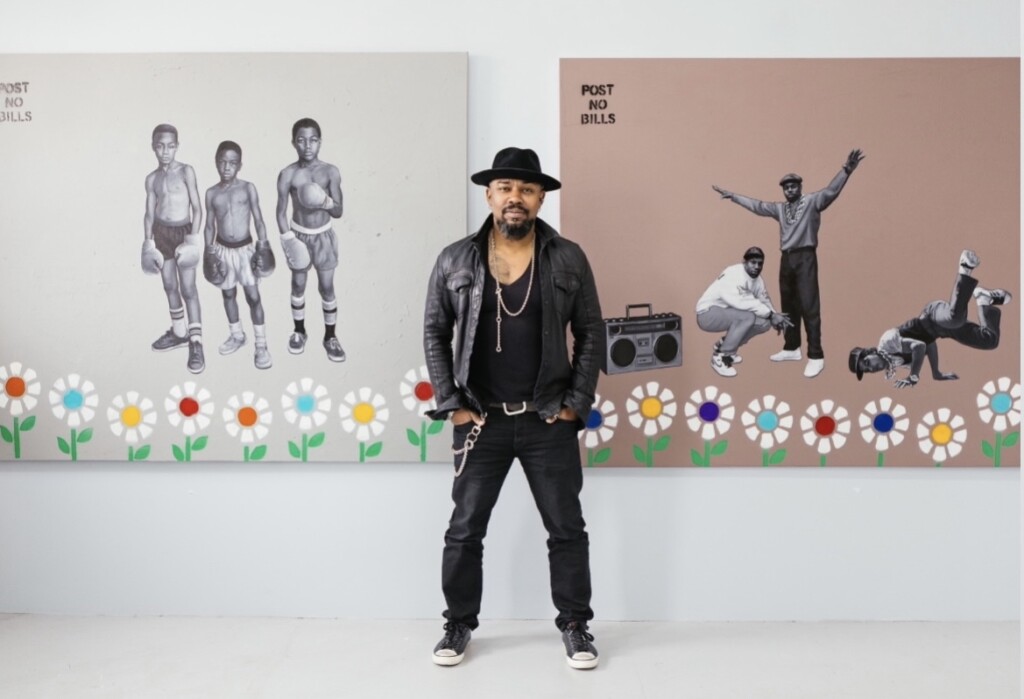Like most industries, Black artists continue to face an uphill battle. From the art admired during the Harlem Renaissance to contemporary works, breaking into a space dominated by white faces and white acceptance has hindered our perception of what art truly is.

Photo Credit: Salvatore Demaio
Yes, we have prominent artists such as Jean-Michel Basquiat and Kehinde Wiley, but too often Black artists continue to get overlooked compared to their white peers. While the lack of acknowledgment for Black art may persist, it does not mean that our art is going unnoticed in communities that appreciate and honor artists who reflect our stories and evoke deep emotions within us.
Artists such as Guy Stanley Philoche know all too well the determination it takes to succeed in a world that does not always embrace him.
For over 20 years, Philoche has built a career many artists dream of, freely conceptualizing his art, his way. Born in Haiti, the Harlem, New York resident moved to Connecticut at 5 years old.
“I was weird…I was an awkward kid who did not speak English,” Philoche says about his move to the States. “All I wanted to do was find my way through the art world… through the world.”

Coming from a Caribbean background, Philoche felt the pressure to follow the path that many had been taught was already laid out for them, influenced by family dynamics, education and religion.
“Our option for a career is either a lawyer, a doctor, an accountant, or something in government,” he says about expectations in his community. “Something with a pension, it is all about a pension.”
Like many other artists and creatives, the passion felt is loud, and the urge to pursue one’s dreams resonates loudly every day. The age-old story of defying societal expectations to follow one’s dreams is as timeless as it is daunting, especially within the realm of the arts. For Philoche, the stars aligned in his youth as he immersed himself in cartoons, ultimately learning English through the art form of animation. It was during this time that the creator of New York I Still Love You discovered his innate talent for drawing, marking his first introduction to the world of art.
“I went on a class trip to a museum, that is when I fell in love with art,” Philoche says about his early beginnings.
Witnessing who Philoche says are masters of art made him understand that he wanted to make art for a living. It wasn’t easy for the Harlem artist to break the news to his strict parents. After graduating high school, Philoche says his mother told him he was “too smart,” and that he had to go to a university or trade school.
“I’m 17 years old and I kissed my parents goodbye and left home,” he says about his journey. In hindsight, Philoche understands why his parents tried to steer him clear of choosing an artist’s life but that did not happen overnight.
Years of resentment took time to heal, but despite obstacles, the fire burned and his passion flourished.

“I’m 46 years old…it took a lot of sacrifices,” Philoche says about his career. “When you’re an artist, you have to ask yourself, ‘What are you willing to sacrifice to get into this career?’ You have to take these big gambles and these big risks,” he explains. “It gets harder and harder to take those gambles and those risks… but then again, it’s like art chose me.”
Being chosen by art has led Philoche to become one of the most in-demand artists of this generation. His latest series Give Us Our Flowers, is a collection of portraits where Philoche mirrors the beauty of the Black community.
“To this day, when I walk into museums, I don’t see portraits of us. It was important for me to show us in a light where we’re not just entertainers, criminals or athletes,” Philoche says. “We are more than that. We’re doctors, lawyers and educators. We’re Judges…it’s really important to show us in those types of atmospheres like everyday people.”
Inspired by a friend’s death, Philoche began the series after wishing his friend received his flowers before his passing.
“I attended his funeral. I saw all the love that people were sharing about his stories… How they wish they told him he was a great father, a great lawyer,” Philoche explains. “I’m in my studio and I just started drawing his portrait… the next thing you know, I told myself I am going to give him his flowers.”
Give Us Our Flowers has been a huge hit in the art world. Philoche began the year with two big shows, one in New York City and the other in Los Angeles. The acclaimed artist is racking up fans throughout the world, including Bruce Lurie, Owner of Lurie Gallery.
“I’ve been following the works of Guy Stanley Philoche for about 10 years now. We’ve also become good friends, though I only really see him at art fairs,” Lurie says of his admiration for Philoche. “I’m so impressed with this new body of work he developed over the past few years. The work captures every day life of African American kids and youth that always puts a smile on my face. His photorealistic playful scenes are provocative and enlightening, always portraying positivity in daily life activities.”

The success of Philoche’s career continued when The Gates Foundation acquired the “Nope Not Today” painting and Delta acquired the “Yes We Can!” painting from Give Us Our Flowers. In addition, the “Wall Street” painting from his series “New York I Still Love You” was just acquired by DV Trading as part of their corporate collection.
For Philoche, his mission has remained the same after 20 years in the industry. He wants spectators to see themselves. To feel. To be inspired.
“I want the viewers to focus on the portraits. I want them to see themself in the works,” he says.
Photo Credit: Salvatore Demaio




